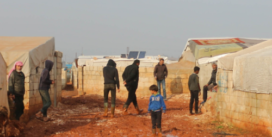- Winter Newsletter, 2025, Issue 14
- STUDENT ESSAY AND THE LIVED EXPERIENCE OF DISPLACEMENT AWARD CONTESTS
- Left out of the Levels Plan: A Call for Accessible Statistics for the Joint Assistance Sponsorship Program to Facilitate Research and Evaluation
- CARFMS2025: Canadian, Regional, and International Responses to Forced Migration
- LESSONS LEARNED FROM THE INDOCHINESE REFUGEE MOVEMENT IN CANADA IN THE 1970s AND 1980s
Program
CARFMS19 Program (as of May 10 2019)
CARFMS19 Conference Keynote Speakers
| Keynote Panel: Elizabeth (Liz) Miller, Concordia University; Stéphanie Gasana , Ayanda Dube, Gracia Jalea Re-Storying Narratives of Displacement Abstract: Too often stories of forced migration or resettlement are told by those in positions of power. These stories are then translated into public opinions and policies that can lead to exclusion or exploitation rather than support or integration. One way to reflect on and challenge both policies and pathways to integration is through the creation and circulation of first-person stories. How can we facilitate creative processes to support the creation of first-person narratives that address refugee, indigenous and climate migration experiences? What is the role of first-person stories in shifting how do we define, support and measure the integration of refugees into communities? And how can we foster processes to think with first-person stories in the formation of policies, practices, and curricula? Mapping Memories, a multi-year project, I brought together Montreal-based educators, filmmakers, policy advocates, organizers, students, and youth to develop participatory media projects for youth with refugee experience. |
Keynote: Caroline Kihato, University of Johannesburg Stealth humanitarianism: Incentivizing the inclusion of urban displaced populations, lessons from the global south Abstract: Over half of the world’s refugees or people living in refugee-like conditions now live in urban areas. This means over 7 million people seek protection in the world’s cities. Yet while raging debates over integration in Europe, North America and Australia continue, it is ‘cities of the South’ that most directly confront the presence of thousands – sometimes hundreds of thousands – of newcomers. Amman, Kampala, Peshawar, Gaziantep, Beirut and Nairobi already accommodate many of the displaced from Syria, Somalia, Congo and the Sudan. Drawing on research conducted in Kampala, Nairobi and Johannesburg, this talk explores the challenges that local governments and urban planners face in trying to address urban displacement. Even where the will to assist exists, municipalities are often unable or unwilling to address refugee needs: refugees are not voters and they compete with local populations for scarce resources. Yet refugees are unlikely to go away and their de facto economic, social and political integration have the potential to reshape urban markets, values and institutions. While universal appeals to the human rights and state obligations towards refugees are important, they can unwittingly provoke xenophobic violence and political backlash from communities facing similar if not worse socio-economic conditions. I argue that building inclusive, resilient and sustainable cities in an era of urban displacement requires ‘stealth work’ incentivizing local leaders, partnering with mid-level bureaucrats and using legal and technical loopholes that expand urban opportunities for marginalized populations. |
Keynote: Liliana Jubilut, Universidade Catolica de Santos Durable Solutions for Refugees and Other Forced Migrants on the Global Compacts Abstract: In late 2018 the Global Compacts on Refugees and on Safe, Orderly and Regular Migration are to be adopted by States after a 2-year process started with the New York Declaration for Refugee and Migrants. The topic is timely as the number of refugees and other forced migrants has been on the rise and the lack of protection is also growing. The process relevant as it is the first time that comprehensive international agreements are to be put in place on refugees and migrants since the 1950s. The creation of a legal document is necessary as a way to implement a rights-based language of protection and to create commitments in protecting refugees and other forced migrants. However, these also need to focus on durable solutions if protection of refugees and other migrants is to be achieved. Thus assessing the Global Compacts’ approaches to durable solutions is essential. |
Keynote Panel: Emerimana Christian, URISE Initiative for Africa; Res Gardi, Harvard University, Harvard Law School; Mustafa Alio, Refugee Career Jumpstart Project; James Madhier, University of Toronto Refugee Agency and Influence in Multiple Spheres Participation refers to the way in which refugees and others forcibly displaced can participate meaningfully and exert influence in decision-making processes that affect their lives. Participation can be used to describe different situations, from a person being able to make informed decisions and fully participate in a local labour market, through to groups of refugees being able to access democratic institutions and political processes (e.g. being able to elect representatives or vote). In the context of the workshop, the focus of discussions is on 1- The impact of the refugee participation on hosting community and their contributions. 2- How refugees and others forcibly displaced can participate (act) and have agency (influence) in decision-making processes at different levels (local, national, regional, global) and in different kinds of spaces (e.g. government, NGOs, community, academia). |
